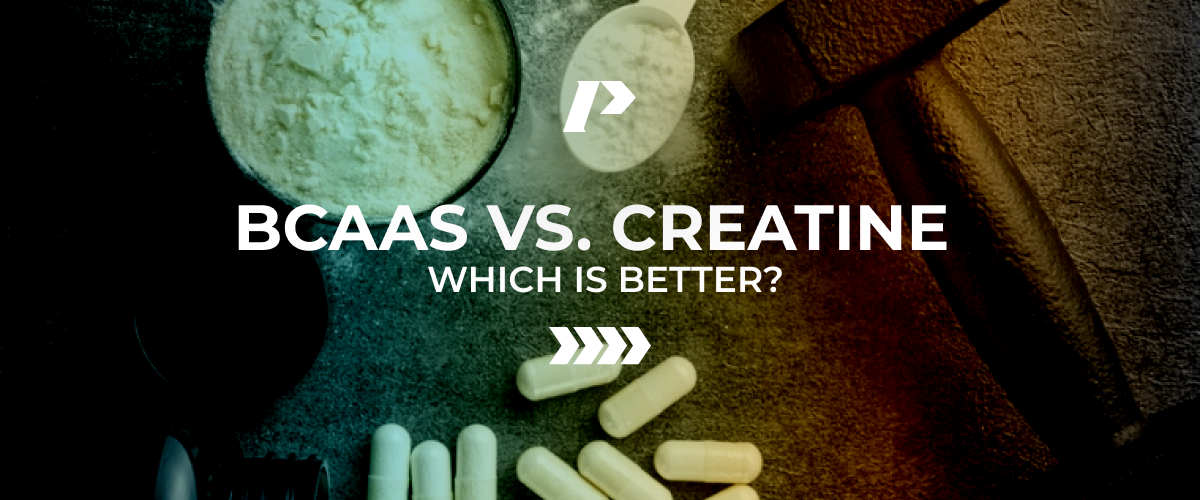When it comes to sports supplements, two that you'll often hear about are BCAAs and creatine. There's plenty of research on them, and they can both help you reach your goals.
It’s no wonder why so many people are looking into them. Both BCAAs and creatine can be helpful for building muscle, improving performance, and more.
But what makes each one worthwhile, and which is better? That’s exactly what we’ll talk about today.
The truth is ... the answer may be quite surprising to you.
Let’s start with BCAAs, what they are, and how they can help!
WHAT ARE BCAAS?
BCAA is an acronym for branched-chain amino acids. They are called this because the structure of the amino acids are branched. This is one thing that sets them apart from the other amino acids.
How many BCAAs are there? Out of a possible twenty total amino acids, BCAAs make up three. These branched-chain amino acids are leucine, isoleucine, and valine.
These three amino acids also happen to be three of the nine essential amino acids. Essential amino acids are considered essential, because your body cannot make them. That means, you must get them from your diet, otherwise your body won’t have what it needs to make proteins.
Now, these essential amino acids are critical when it comes to muscle growth and repair. Of these nine amino acids, BCAAs happen to be the three most important.
That’s why BCAAs are so popular! However, their benefits are actually a little overstated. Let us explain…
BENEFITS AND DRAWBACKS OF BCAAS
BCAAs are a popular choice for a reason. I mean, they are the three most important amino acids when it comes to stimulating your muscles to rebuild.
When you work out, you will generally see some level of muscle soreness after a day or two. This is called delayed onset muscle soreness (DOMS). DOMS is thought to be from the breakdown of your muscle fibers during your workout.
If you break down your muscle tissue during training, and that makes them sore, where do BCAAs come in?
BCAAs have been shown to help reduce DOMS1. Although, the extent to which they reduce this soreness depends. It depends on how long you’ve been training, and the dose of BCAAs you take.
Some studies also say that BCAAs can lower muscle damage and enhance recovery2. So, in reducing muscle damage from exercise, that's how BCAAs theoretically enhance recovery.
But … how do BCAAs do this? To really explain this, let us back up a second.
Your muscles are in a constant state of breakdown, but they are constantly rebuilding too. Both happen simultaneously all the time.
Muscle protein synthesis is the process of building muscle. Muscle protein breakdown is the exact opposite.
In order to build muscle, muscle protein synthesis must exceed muscle protein breakdown.
When you supplement with BCAAs, they can kick-start muscle protein synthesis. The issue is, in order to fulfill the process, you must have the other 6 essential amino acids as well.
If you don’t get the other EAAs from food or a supplement, the only ones available will come from broken-down muscle. Studies show that muscle breakdown still exceeds muscle growth by 30% when taking BCAAs alone4.
In addition, a 2017 study showed that BCAAs alone have poor evidence of reducing muscle damage5. Both studies' conclusions line up pretty well.
Let us simplify it:
In order to promote muscle protein synthesis from BCAAs alone, you must increase muscle protein breakdown. It’s the only other way your body can get the essential amino acids it needs if you don’t get them through your nutrition.
Don’t get us wrong, it’s more beneficial to take BCAAs than taking nothing, but it’s not as good as taking an EAA product or a complete protein source.
One situation where BCAAs could serve you well is if you aren’t consuming protein sources with high concentrations of these branched-chain amino acids on a consistent basis.
But, now that we’ve gone in-depth about BCAAs, let’s take a look at creatine.
WHAT IS CREATINE?
Creatine is the most researched supplement in the world. A lot of the proposed benefits have been proven time and time again as well!
Before we get into that though, let’s cover what creatine actually is.
Creatine is a naturally occurring non-protein amino acid. You get some in your diet when you eat meat and fish, but your body produces it as well.
We store it in our muscles mostly, but it’s also in the heart and brain too.
The reason many people, started using creatine is all about better performance. What we are referring to when we say "performance" ... is more strength, more power, and better endurance.
Creatine does this by supplying energy to your muscles in the very early stages of exercise. You see, the most simple energy currency every cell in your body uses is called ATP. This stands for adenosine triphosphate. All the food you eat gives you energy, and ATP is the energy source made from that food.
So, whether it comes from carbohydrates, fats, or protein, it is still ATP that gets produced. Each of these produces the ATP at a different rate though.
Carbs produce ATP faster than protein and fats. Fats take the longest, and protein is only used for energy if nothing else is available.
So, your body gets energy from carbs the quickest, but it still takes some time to pull the energy from those carbs. So there is a little lag time before this energy is actually available.
Before you have energy available from carbs, you do have some stored ATP ready for use. It gets used up almost immediately though once you get into your sets.
That’s where creatine comes in, but to explain this, you first need to know how ATP works. The way ATP gives us energy is simple.
The adenosine molecule has 3 phosphates attached. To use this energy, we have to break off one of those phosphates. Once that phosphate breaks off, it releases energy that we harness and use.
The ATP then becomes ADP, or adenosine diphosphate because only 2 are left. Creatine is bound to a donatable phosphate in our muscles, and this makes things much faster.
When ATP loses a phosphate and becomes ADP, creatine donates its phosphate to make it ATP again. This happens rapidly for the first 10-15 seconds of every set of intense exercise.
Without creatine to recycle ATP, it would take us about 15 seconds before we would have usable energy. It would be like having to let our engine warm up first before we could really push ourselves.
Most people don’t have as much creatine in their muscles as they can carry. So supplementing with it maximizes our energy stores for peak performance.
BENEFITS AND DRAWBACKS OF CREATINE
Creatine has many proven benefits that you can’t argue with. When it comes to optimizing performance, creatine is top-tier.
Studies show that creatine usage can significantly increase levels of muscular strength6. Strength increases are great, but creatine can also boost power and endurance too7.
The reason for this is what we explained in the last section.
With more creatine, you have access to more energy. More energy all at once allows your muscles to produce more force. Not only that, but you can produce it faster, and produce it for longer.
When it comes to the drawbacks of creatine usage, there aren’t many.
Over 1,000 studies have been done on creatine, and over a billion servings have been ingested. The only consistently reported side effect was weight gain8. That weight gain isn’t fat either, because it’s water weight gain.
Creatine plays a role in fluid retention, so adding creatine can cause some water weight gain. The weight gain is in your muscles though, so I don’t even consider it a negative.
A more hydrated muscle is a healthier muscle. That’s definitely a positive in my book.
There are some people who may get an upset stomach if they take too much at once. That’s about as negative as it gets, and not everyone experiences this.
SO, WHICH IS BETTER: BCAAS OR CREATINE?
To be honest, this question is comparing apples to oranges. They are both very different products, and they aren’t meant to do the same thing.
But with that being said, if I have to choose between taking either BCAAs or creatine, we’re choosing creatine 100% of the time.
There are no serious downsides to taking creatine. On the flip side, taking just the 3 BCAAs does actually have some downsides, unless you take them with the other EAAs.
So really, if you have to choose one or the other, we would personally recommend creatine. It has more proven benefits with fewer drawbacks.
Creatine and BCAAs work in different ways though, and you could be cutting yourself short by picking only one. Only taking creatine will leave you without the amino acids your muscles need to repair and grow.
BCAAs aren’t your best option either, so it’s best to find a proper alternative.
So, the next question would be … what is the best alternative to BCAAs?
BEST ALTERNATIVE TO BCAAS
People take BCAAs to stimulate muscle protein synthesis for muscle growth and repair. The problem is, they don’t supply all of the amino acids you need, so they won’t do the job effectively by themselves.
So where could you get all of the amino acids you need?
Whey protein is the best option and contains every amino acid your body needs to build muscle. EAAs are another great alternative that give you all 9 of the amino acids your body needs to build muscle.
BCAAs do not share those benefits, and that’s why whey protein and EAAs are superior.
Allow us to paint a picture for you as to why BCAAs won’t be as effective as EAAs or whey protein.
Think of building muscle like bricklayers building a wall. The BCAAs are the bricklayers, and the other 6 essential amino acids are the bricks. You can’t build the wall without either one.
When you take BCAAs by themselves, it’s similar to setting up bricklayers with no bricks. So they must break down a nearby wall to build their own wall with those bricks.
That’s not very ideal, and the finished product won’t likely be very good.
That said, if you throw in whey protein or EAAs, it’s a totally different story. That’s like setting them up with a fresh pile of bricks to start building.
As long as you get a sufficient amount, you’ll be much better off. You'll be able to build muscle without having to break down existing muscle for more amino acids. That’s literally the goal of building muscle.
Whey protein or EAAs and creatine together would be a great 1-2 punch. Creatine boosts muscle strength, power, and endurance while the whey protein/EAAs will aid in muscle repair and growth.
BCAA VS CREATINE: THE TRUTH
To really sum all of this up, we’ll make it simple and clear.
Creatine is a phenomenal supplement with tons of research that can benefit you. We highly recommend it.
BCAAs are not a horrible product to choose, but there are better options out there. BCAAs are not as beneficial as EAAs, and EAAs aren’t as beneficial as whey protein.
They’re all made from amino acids, but whey protein will give you the most of what you need to repair and recover. EAAs give you the bare minimum of what you need, while BCAAs just flat out don’t give you everything you need.
Does that mean taking BCAAs is worse than using nothing? No, not at all. I would rather you at least be able to support some muscle repair than none at all.
It just isn’t the best option out there.
Regardless of what supplements you take though, there is more to the equation. If you want to build muscle, there are other important factors you shouldn’t overlook.
Your diet needs to be on point, and you need to lift heavy weights for a lot of volume. It’s easier said than done, and many people don’t actually know how to do those properly.
Have random questions about food, workouts, or supplements? You can message us any time via at pronutrition@jadholdings.asia, or book a call with us here:
Trust us when we say our goal is to give you the best chance to be successful in reaching any fitness goal. We’re here and we want to help! We’ll do whatever we can to help you get the results you’re looking for!
REFERENCES:1 Weber MG, Dias SS, de Angelis TR, Fernandes EV, Bernardes AG, Milanez VF, Jussiani EI, de Paula Ramos S. The use of BCAA to decrease delayed-onset muscle soreness after a single bout of exercise: a systematic review and meta-analysis. Amino Acids. 2021 Nov;53(11):1663-1678. doi: 10.1007/s00726-021-03089-2. Epub 2021 Oct 20. PMID: 34669012.
2 VanDusseldorp TA, Escobar KA, Johnson KE, Stratton MT, Moriarty T, Cole N, McCormick JJ, Kerksick CM, Vaughan RA, Dokladny K, Kravitz L, Mermier CM. Effect of Branched-Chain Amino Acid Supplementation on Recovery Following Acute Eccentric Exercise. Nutrients. 2018 Oct 1;10(10):1389. doi: 10.3390/nu10101389. PMID: 30275356; PMCID: PMC6212987.
3 Fouré A, Bendahan D. Is Branched-Chain Amino Acids Supplementation an Efficient Nutritional Strategy to Alleviate Skeletal Muscle Damage? A Systematic Review. Nutrients. 2017 Sep 21;9(10):1047. doi: 10.3390/nu9101047. PMID: 28934166; PMCID: PMC5691664.
4 Wolfe RR. Branched-chain amino acids and muscle protein synthesis in humans: myth or reality? J Int Soc Sports Nutr. 2017 Aug 22;14:30. doi: 10.1186/s12970-017-0184-9. PMID: 28852372; PMCID: PMC5568273.
5 Baker JS, McCormick MC, Robergs RA. Interaction among Skeletal Muscle Metabolic Energy Systems during Intense Exercise. J Nutr Metab. 2010;2010:905612. doi: 10.1155/2010/905612. Epub 2010 Dec 6. PMID: 21188163; PMCID: PMC3005844.
6 Wang CC, Lin SC, Hsu SC, Yang MT, Chan KH. Effects of Creatine Supplementation on Muscle Strength and Optimal Individual Post-Activation Potentiation Time of the Upper Body in Canoeists. Nutrients. 2017 Oct 27;9(11):1169. doi: 10.3390/nu9111169. PMID: 29077022; PMCID: PMC5707641.
7 Forbes SC, Candow DG, Neto JHF, Kennedy MD, Forbes JL, Machado M, Bustillo E, Gomez-Lopez J, Zapata A, Antonio J. Creatine supplementation and endurance performance: surges and sprints to win the race. J Int Soc Sports Nutr. 2023 Dec;20(1):2204071. doi: 10.1080/15502783.2023.2204071. PMID: 37096381; PMCID: PMC10132248.
8 Kreider RB, Kalman DS, Antonio J, Ziegenfuss TN, Wildman R, Collins R, Candow DG, Kleiner SM, Almada AL, Lopez HL. International Society of Sports Nutrition position stand: safety and efficacy of creatine supplementation in exercise, sport, and medicine. J Int Soc Sports Nutr. 2017 Jun 13;14:18. doi: 10.1186/s12970-017-0173-z. PMID: 28615996; PMCID: PMC5469049.




